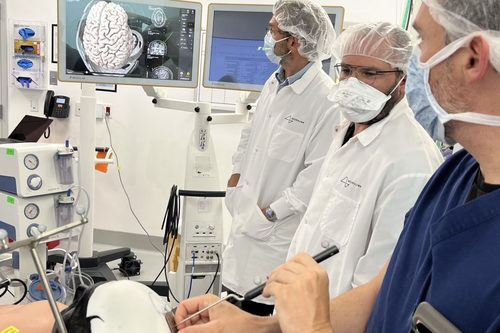Neuralink, the brain-computer interface (BCI) company founded by tech magnate Elon Musk, has initiated its first human brain implant trials.
ALSO SEE: A UCT professor is developing revolutionary STI detection technology
The company’s ultimate goal, according to a blog posted by Neuralink, is to empower individuals grappling with paralysis by allowing them to control computers and devices through their thoughts alone.
We’re excited to announce that recruitment is open for our first-in-human clinical trial!
If you have quadriplegia due to cervical spinal cord injury or amyotrophic lateral sclerosis (ALS), you may qualify. Learn more about our trial by visiting our recent blog post.…
— Neuralink (@neuralink) September 19, 2023
This major announcement follows Neuralink’s acquisition of human clinical trials by the US Food and Drug Administration (FDA) in May earlier this year – a move that sparked controversy throughout the scientific and regulatory communities.
Neuralink’s human trials will involve the use of robotic assistance for implanting its BCI device, colloquially referred to as ‘the Link.’
This implant will provide participants with the ability to control computer cursors or type text solely through their thoughts, potentially becoming the beacon of transformation in the lives of individuals with paralysis.
At the heart of these trials is the use of a highly advanced robot to surgically place 64 ultra-thin threads, each thinner than a human hair, into a specific region of the brain responsible for “movement intention.”
It can be difficult to visualize how tiny our threads are. We had a banana for scale, but Pager ate it 🍌 pic.twitter.com/l11eBWd7e9
— Neuralink (@neuralink) August 23, 2023
These threads are integral in enabling Neuralink’s experimental N1 implant – a device powered by a wireless rechargeable battery. The implant records and wirelessly transmits brain signals to an app, which then interprets the user’s intended movements.
The trial’s eligibility criteria stipulate that participants must be individuals with quadriplegia due to injury or amyotrophic lateral sclerosis (ALS).
Our surgical team enhances their skills by training on realistic, patient-specific head and brain models, ensuring surgeries are tailored to each individual for safety and success 🧠 pic.twitter.com/1HvXbeG3Fm
— Neuralink (@neuralink) August 1, 2023
According to an article published by the BBC, Neuralink is not alone in the BCI race.
Neuralink faces competition from longstanding rivals in the BCI field. Blackrock Neurotech, a Utah-based company, implanted its first BCIs as far back as 2004.
Another contender, Precision Neuroscience, founded by a co-founder of Neuralink, offers an implant resembling a thin piece of tape that sits on the brain’s surface. This implant can be inserted via a less invasive ‘cranial micro-slit’ procedure.
While the BCI landscape is populated with promising players, existing devices have already demonstrated their potential.
ALSO SEE:
The latest technology in Diabetes Mellitus makes big strides
Feature Image: Twitter / Neuralink

